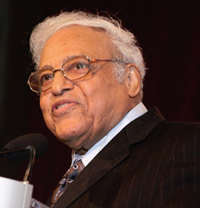Civil Rights giant Benjamin Hooks, who boosted NAACP, dead at 85
By Lucas L. Johnson II Associated Press | Last updated: Apr 25, 2010 - 1:07:29 PMWhat's your opinion on this article?

Benjamin Hooks Photo: NAACP
|
Across the country, political leaders and Mr. Hooks' peers in the civil rights movement remembered his remarkably wide-ranging accomplishments and said he'd want the fight for social justice to continue. State Rep. Ulysses Jones, a member of the church where Hooks was pastor, said Mr. Hooks died at his home April 15 following a long illness.
“Right up to the last, he conveyed ... the need for us to fight,” said NAACP President Benjamin Jealous, recalling a speech Mr. Hooks gave last year. Mr. Hooks “gave a speech as fiery as any he's given 50 years earlier.”
Mr. Hooks took over as the NAACP's executive director at a time when the organization's stature had diminished in 1977. Years removed from the civil rights battles of the 1960s, the group was $1 million in debt and its membership had shrunk to 200,000 members from nearly a half-million a decade earlier.
“Black Americans are not defeated,” he told Ebony magazine soon after his induction. “The civil rights movement is not dead. If anyone thinks that we are going to stop agitating, they had better think again. If anyone thinks that we are going to stop litigating, they had better close the courts. If anyone thinks that we are not going to demonstrate and protest, they had better roll up the sidewalks.”
By the time he left as executive director in 1992, the group had rebounded, with membership growing by several hundred thousand. He used community radiothons to raise awareness of local NAACP branches' work and to boost membership.
“He came in at a time the NAACP was struggling and gave it a strong foundation. He brought dignity and strong leadership to the organization,” Mr. Jones said.
State Rep. John Deberry, a fellow minister and chairman of the Tennessee Black Caucus, said Mr. Hooks' passing is a sobering reminder that “we are losing an incredible generation of men and women who changed the world.”
“And I hope that all these young folks who accept their rights with such a cavalier attitude, those who are disrespectful to their seniors, those who go to these schools and misuse the opportunities ... realize that as these men and women move off the scene, that somebody has to step up,” Mr. Deberry said.
New York Gov. David Paterson remembered Mr. Hooks for fighting to expand opportunities for Blacks.
In the waning years of his leadership of the NAACP, Mr. Hooks pressed then-President George H.W. Bush for action on a string of gasoline bomb attacks in the South that killed a federal judge in Alabama and a Black civil rights lawyer in Georgia in December 1989. The same month, another bomb was intercepted at an NAACP office in Jacksonville, Fla.
The man later convicted of the killings and other charges remains on Alabama's death row.
(Associated Press writers Joe Edwards in Nashville, Yvette Blackman in New York, Daniel Yee in Atlanta contributed to this report.)
INSIDE STORIES AND REVIEWS
-
-
About Harriett ... and the Negro Hollywood Road Show
By Rabiah Muhammad, Guest Columnist » Full Story -
Skepticism greets Jay-Z, NFL talk of inspiring change
By Bryan 18X Crawford and Richard B. Muhammad The Final Call Newspaper @TheFinalCall » Full Story -
The painful problem of Black girls and suicide
By Charlene Muhammad -National Correspondent- » Full Story -
Exploitation of Innocence - Report: Perceptions, policies hurting Black girls
By Charlene Muhammad -National Correspondent- » Full Story -
Big Ballin: Big ideas fuel a father’s Big Baller Brand and brash business sense
By Bryan Crawford -Contributing Writer- » Full Story






 Click Here Stay Connected!
Click Here Stay Connected!








